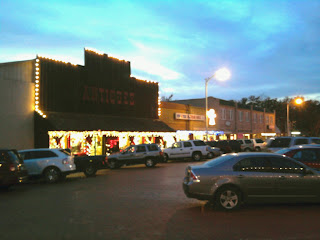This past weekend, I spent a wonderful day shopping for antiques in Gladewater TX. Gladewater is known as the "Antique Capital of East Texas". Actually, some of these titles are somewhat humorous here in Texas primarily because of its immense size. When googling Gladewater, I found that there are perhaps 5 different "antique capitals" here in Texas; one for each region of the state. Once I found the our destination, my fiancee and I were off with a late start to spend a great day in small town-rural Texas, as well as find some antiques to use in our upcoming wedding (maybe we can find a spot for this too!)

Later in the week, while working and generally reflecting on the wonderful time that I had spent among the town's people in Gladewater, I came across a recent podcast on Colorado Matters, an NPR show dealing with a wide range of Colorado issues and was stuck by the similarities between my weekend experience and the relationship of the Great Plains to the Rocky Mountains describe by Micheal Forsberg. Forsberg has just finished a new book entitled "The Great Plains: America's Lingering Wild" which documents the beauty and diversity of the fly over region in America. Listen
Here.
Near the end of the interview, Author Michael Forsberg makes an interesting comment about the theoretical, geographical and social divide so prevalent at the foot of the Rocky Mountains in Colorado. He mentions the tension between the Great Plains and the Colorado Front Range while plainly stating that many of today's rancher's out east are begging people to "look East because there is beauty [there] too". This sentiment could not resonate stonger in me having grown up on the Front Range and been given an eye-opening chance to look and experience the vast East on the plains.
How, then, does this connect in any way with Gladewater Texas and a quick road trip to look at antiques? The contrast between the immense flat of the Great Plains in comparison to the towering height and beauty of the Rocky Mountains stuck me in a moment of thought to be vividly similar to that of the urban versus rural debate. The towering urban landscape easily parallels the Rocky Mountains in this hypothetical portrait, teaming with life and rich in biodiversity of people, culture, entertainment and careers. On the other hand, small rural towns are eerily similar to the Great Plains. Many seem the same; small, flat and uninteresting, lacking the pizzazz and energy that a growing number of people thrive on.
As the author suggests in the interview, one must spend some time in the vast openness of the plains to grasp the gravity of their significance and the beauty of their simplicity. Paradoxically, my fiancee and I were able revell in a similar notion while visiting Gladewater this past weekend. Finding the beauty and simplicity of this East Texas hamlet would take some time and observation to appreciate. In fact, even myself who is accustomed to small rural towns was somewhat turned off by the lack luster entrance to Gladewater. My hopes of a quaint and friendly town were quickly dashing away as we approached the town with a somewhat unwelcoming appearance. But then, as we reached the hub of the town, I was able to see with the great promise and fun this experience this might offer, similar to the thoughts of the author enraptured by the wild beauty of the plains. Indeed, we would need to linger awhile in town to find what we were looking for.
Unbeknownst to us, my fiancee and I happened upon a special event put on by the town to mark the official beginning of the holiday shopping season. Instead of closing at the usual Saturday time, the merchants all around the town square were going to be open until 8 that particular night, hoping to invite a crowd of people to enjoy beverages, food and fellowship while helping to jump start the holiday season the stores for the community stores. We watched as the small town came alive with a strong showing of patrons to populate the sidewalks and stores while sharing their friendly town with us. Stores became filled with people sharing stories, laughing, and eating all while the faint ring of the cash register kept account of the events success.
What a truly great surprise this had been; a genuine rural experience in small town America. This is the stuff they make holiday movies about, hoping to give us warm fuzzies while we sip hot chocolate and reminisce with family. Hats off to Gladewater Texas and their Lingering Rural.









